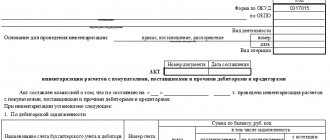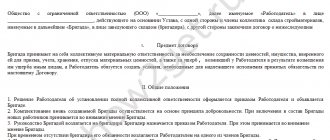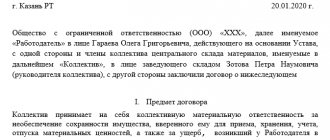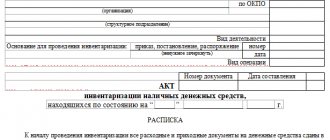Law on the dismissal of a financially responsible person
Any relationship, including labor relations, is no exception; sooner or later they can be broken.
The dismissal of an employee, regardless of what obligations he has and whoever he is, must occur as required by current legislation. The general rules for dismissal from positions are described in Article 84.1 of the Labor Code of the Russian Federation.
How to calculate an official carrying a mat. responsibility? This question often worries employers. How to make an inventory of assets belonging to the enterprise, how to entrust mat. values that belong to an employee of an organization to another person? Is it possible to reduce the staffing level that is responsible for the values entrusted to it, etc. We will try to answer these and other questions today.
Inventory: is it possible to do without it?
In accordance with the Regulations on accounting and financial reporting in the Russian Federation (approved by order of the Ministry of Finance No. 34n dated July 29, 1998), which regulates the procedure for maintaining accounting in organizations, inventory is mandatory in the event that the person responsible for material assets changes.
The result of this procedure is the drawing up of an act that confirms that the employee has fulfilled his obligation to ensure the safety of property or, conversely, allowed it to be lost.
To carry out the inspection, by order of the employer, a special commission is created, which is entrusted with the authority to carry out the inventory. When it is carried out, the resigning MOL and the newly appointed one (if a new employee has already been found) must be present.
The purpose of the audit is to establish possible damage or its absence. If the fact of damage or shortage of the organization’s property is established, the responsible employee will be held liable.
The inventory is carried out according to the established procedure.
- The management of the organization adopts the corresponding order.
- A commission is being formed.
- The actual presence of property is revealed and compared with the recorded data (values are identified, identified, their quality and quantity are checked in accordance with accounting registers).
- Based on the results of the audit, a document on its results is drawn up. Three equal copies are made (for the organization, for the new employee and for the resigning employee).
- If a shortage or surplus is detected, this is recorded in accounting in the period in which the inventory took place, and an inventory is also compiled.
- In case of non-compliance, the MOL provides written explanations.
- Next, the nonconformity is assessed and a connection is established between the actions of the responsible employee and the damage.
- If a connection is identified, the employer’s order formalizes the recovery of damages from the employee.
Transfer and Acceptance Certificate
When the inventory has been completed and all inventory items have been reconciled, all assets entrusted to the employee must be transferred back to the employer. The transfer is formalized by drawing up a special act of acceptance of goods and materials. This act records the following information:
- about the employing organization (name, address and other details);
- about the resigning employee;
- about a new financially responsible employee (if a new employee was found for the position or one of the old ones was appointed);
- a list of returned property (the name, quantity and quality of material assets are indicated);
- the time period during which the retiring employee was responsible for the safety of the assets;
- date of document preparation.
The act is sealed with the signatures of the employer and employees. The signing of the act by all participants certifies the removal of financial responsibility from the retiring employee and its transfer to a new person.
Liability Agreement
There are two situations of transfer of values after the dismissal of the previous MOL:
- when a new employee was not found for a vacant position;
- when there is an employee who is immediately ready to sign the contract and can begin to perform his duties.
In the first situation, the responsibility for storing the organization’s assets can be transferred to another employee of the enterprise, with whom it is possible to enter into an agreement on liability.
An employer should not:
- assign responsibilities for storing valuables to a person who cannot be a MOL;
- entrust storage of inventory items to a person without signing a liability agreement.
In such situations, the employer will not be able to subsequently protect the property rights of the organization and recover damages caused to it from the employee.
The procedure for transferring values
There are two generalized models for the transfer of values, and neither is standardized by law .
- The first is that a candidate for the vacant position that is being vacated has not yet been found.
- The second is that there is already another employee ready to start work the next day after the predecessor leaves the position.
Let's consider the first model. It is clear that the work related to maintaining the organization’s property cannot be entrusted to the first person who comes along. Therefore, finding a candidate may take some time. Under such conditions, it is worth looking for a replacement among the company’s employees.
ATTENTION! Valuables should not be transferred to employees with whom it is impossible to conclude a full agreement. responsibility. Such a mistake can cost the employer dearly. The legislation does not allow the employer to enter into an agreement with all employees of the enterprise.
If the agreement was signed with an employee of the organization, whose job responsibilities (work performed) are not on the list set out in the said resolution, the employer will not be able to hold him accountable and recover damages from him.
You should not transfer valuables or enter into an agreement with a person who is not officially hired for the position.
- Before dismissal, the employee transfers the valuables to the commission, which conducts an inventory.
- The room where material assets are stored (a safe with monetary values) is sealed by the commission.
- The next day, after the dismissal of the previous employee is formalized, a new one is hired and the valuables are transferred to him.
It is this kind of procedure that is provided for by the legislation of the Russian Federation.
You can learn more about changing a materially responsible employee and transferring his responsibilities to another here.
Types of financial liability
The obligation to take care of the company’s property is one of the main ones prescribed in Art. 21 Labor Code of the Russian Federation. This means that the intentional destruction or accidental loss of any value that is used in work or stored by the enterprise must be compensated by the guilty employee.
However, there are a number of specialists whose direct responsibilities include the preservation of inventory. This responsibility can be assigned in several ways:
- full;
- collective complete;
- within the limits of proven actual damage caused (based on a custody agreement or investigation data)
It is noteworthy that a person becomes financially responsible even if an agreement on full liability was not initially signed with him. During the course of work, an employee may be given some property for use in the performance of work functions. If a transfer document was signed, then the person must understand that this is called custody and can have material consequences.
This is also important to know:
Reasons for leaving a job: grounds for terminating an employment contract
In recent years, a situation has arisen everywhere where new and old employees are universally asked to sign agreements on full financial responsibility. In this way, the employer carries out preventive work, believing that the fear of official paper will contribute to increasing thriftiness in the team. But by referring to the norms of the Labor Code of the Russian Federation, one can understand that such clauses in an employment contract or an additional agreement to it can only be used when hiring positions from the list approved by Decree of the Government of the Russian Federation No. 823 (for example, cashiers, sales workers, storekeepers, etc. .)
An extraordinary inventory is carried out with each change of responsible persons (temporary absence from work or dismissal).
How to leave a position of your own free will?
Now, in more detail about the procedure for dismissing a financially responsible person at his own request. To resign from a position on your own initiative, you must follow this procedure:
- the employee must notify the employer in writing at least 14 days in advance (unless there is a valid reason for exemption from work);
- further, the commission, in the presence of the financially responsible employee leaving his post, must take swear words from him. valuables and take inventory. If a deficiency or damage to property is identified, a report is drawn up;
- the employer, in turn, must draw up a dismissal order;
- on the last working day, the employee is given a work certificate against signature and the final payment is made to him.
Even if a shortage is identified, the employer does not have the right not to give the employee the work permit. If the employee does not agree to pay the shortfall, the employer has the right to go to court.
An employer cannot help but fire an employee of his organization until he has transferred valuables. The procedure for dismissing a financially responsible employee certainly has its own characteristics, but the grounds and execution of personnel documents are standard, as for all other employees. And it doesn’t matter who initiates the dismissal: the employee or the employer.
EXAMPLE:
The employee submitted a letter of resignation of his own free will. After the two weeks required in this case, the employer must pay the employee off. The position “I’ll fire you when you hand over the valuables received” is a direct path to a lawsuit, since there is a violation of labor laws.
The Labor Code of the Russian Federation (LLC) does not link the right of an employee to quit at his own request with any production circumstances: the need to complete a project, complete negotiations, hand over received valuables.
Organizing the transfer of valuables is the employer’s task. Of course, this also takes time.
We discussed earlier what a financially responsible person means and the list of positions falling under obligations. You may also find other materials useful on how to:
- a financially responsible person is appointed;
- an order is drawn up to appoint such an employee.
What to do if inventory is delayed
The employer does not always have the opportunity to complete the inventory before dismissing the employee: there is not enough two-week work period or the employee leaves earlier, which is possible if he resigns due to retirement.
If the moment of dismissal occurs before the end of the inventory, the company does not have the right to forcefully retain the citizen in his position. In such a situation, there are two options:
- dismiss the employee before the inventory is completed, and if a deficiency is subsequently identified, recover it through the court;
- agree with the resigning person on dismissal by agreement of the parties and determine in the agreement the date that will occur after the end of the inventory.
IMPORTANT!
The transfer of material assets upon dismissal of one's own free will is an important and mandatory part of the procedure for dismissing the person responsible. The organization of this process is the responsibility of the employer.
Do you need an inventory?
The circumstances under which values need to be transferred may vary, as will the manner in which they are transferred. However, under any conditions, before the dismissal or change of the person responsible for the property, an inventory is carried out.
It is not permissible to transfer entrusted valuables to any other person under a deed without conducting a complete inventory.
Property inventory is the only way:
- establish what and how much value is transferred;
- record the quantity and integrity of existing values.
So, as we see, without an inventory of property, it is impossible to change the person responsible for its safety.
ATTENTION! The provision applies to all organizations and is absolutely independent of their legal form and form of ownership.
The employer carries out an inventory not only to comply with the requirements established by law. First of all, this is a way to protect the financial interests of the enterprise itself.
The inventory should be carried out in the presence of the financially responsible official and the commission that accepts the valuables from the employee.
You can find out who is the financially responsible person before conducting an inventory in this article.
Algorithm
The Ministry of Social Policy draws attention to the fact that before accepting another official for a position, it is necessary to release the one who occupies it, and proposes the following sequence of actions for the release of the materially responsible official:
- The financially responsible person transfers the valuables entrusted to him to another employee according to the act.
- The head of the enterprise issues an order on the temporary appointment of this employee (he must belong to the same category of personnel). An agreement is concluded with an employee of the organization and valuables are transferred to him according to the act.
- They hire a new employee and sign a contract with him. The temporarily appointed employee transfers the valuables to the newly hired employee under the act.
In such a situation, you will have to take inventory twice and draw up two acts. The algorithm of actions will be as follows:
- We determine the employee who will perform the duties.
- We obtain the employee’s consent to perform such additional work on a part-time basis.
- We carry out an inventory, the employee is released and transfers the property to another employee of the enterprise according to the act.
- We formalize the dismissal of an employee with financial liability.
- We assign another employee of the company to perform additional work on a part-time basis.
- We conclude an agreement.
- We are looking for a new permanent employee.
- We carry out an inventory.
- We cancel the combination.
- We are hiring a new permanent employee.
- We conclude an agreement.
- The replacement employee transfers valuables according to the act.
According to the second model, when a successor has been selected for the position of the materially responsible official, the procedure can be simplified.
Step-by-step instructions on transferring valuables to another employee can be found here.
Difficult moments when dismissing a pensioner
The biggest risks for an employer arise in a situation where a financially responsible person resigns due to retirement of his own free will. In this case, the organization has an obligation to terminate the contract with him on the date specified in the application. That is, without mandatory work. And a situation may arise when a pensioner leaves one day and there is no time left .
However, the employer does not have . He is obliged to release the retired employee within the period specified in his application.
The fact of termination of the employment relationship does not relieve the former employee from the obligation to compensate for direct actual damage arising in connection with the shortage of valuables due to his fault . Therefore, after termination of the contract, the tenant has the right to demand compensation for damage in court (Part 3 of Article 232 of the Labor Code of the Russian Federation).
IMPORTANT!
The company has the right to file a claim for compensation for the identified damage within 1 year from the date of its discovery (Part 3 of Article 392 of the Labor Code of the Russian Federation).
Even if the employee is notified that an inventory will be carried out in his absence, if a shortage is identified, the results of such an inventory may turn out to be insufficient evidence for the court, since it was formally carried out in violation . To receive compensation, the employer will need to prove in court:
- that there are no reasons excluding the liability of the financially responsible person;
- that the damage arose due to illegal actions or inactions of the dismissed person;
- the employee’s fault for the shortage;
- the presence of a cause-and-effect relationship between the employee’s behavior and the losses incurred;
- compliance with the requirements for liability contracts;
- validity of the amount of damage caused.
However, carrying out an inventory in the absence of an employee - after the date of his actual dismissal - can make proving these facts, and, accordingly, collecting damages, quite problematic (ruling of the Supreme Court of the Russian Federation dated 05/07/2018 No. 66-KG18-6).
IMPORTANT!
The dismissal of an employee does not deprive the employer of the opportunity to involve him in participation in the inventory, but only with his written consent. However, the company does not have to force .
How does the transfer occur?
Regardless of the type of relationship, it ends at a certain point. The procedure for terminating a working relationship with a person, regardless of his position, must be carried out in accordance with the provisions of the current legislation. The basic rules are stated in Article 84.1 of the Labor Code of the Russian Federation.
Currently, two methods of transferring property upon dismissal of a citizen are used, while neither form is reflected in the laws. These forms are presented:
- if a person who will fill the vacated position has not yet been found;
- when a candidate for a vacant position is found.
Speaking about the first option, it is necessary to take into account that the management of the organization cannot assign the responsibility for maintaining the company’s values to the first person who contacts the personnel department. For this reason, finding a suitable employee takes a lot of time. In this case, you need to consider the possibility of taking this position by someone who already works in the company.
It is established that it is not permissible to transfer valuables to citizens in respect of whom the provisions on financial responsibility cannot be applied. If this requirement is not taken into account, the company's management may regret it. The Government Decree reflects the positions of employees with whom it is permissible to form this agreement. If a company has signed an agreement with someone who occupies a position not noted in the list, it will not be possible to subsequently hold such person financially liable.
In addition, there is no need to sign an agreement with a citizen who is not officially employed by the company. Before resigning, a person transfers to the authorized commission the valuables that were entrusted to him for the duration of his official duties. The place where such valuables were stored, for example, a safe, is sealed. When the working relationship with one person is terminated, a new person begins work. On the same day, the company's property is transferred to him.
What if you find a shortage?
When, during an inventory, the company's management finds out that there is a shortage, it becomes possible to go to court and demand compensation. The procedure and timing of the inventory must be described in acts that have administrative and economic significance in the company. The order must indicate which employee will be part of the commission and the period for conducting the accounting procedure.
If a company has financial claims against a former employee, then it is necessary to apply to a judicial authority to resolve them.
Thus, the procedure for terminating employment relations with financially responsible employees presupposes compliance with established legal norms. An inventory needs to be taken. If there is a shortage, go to court.









